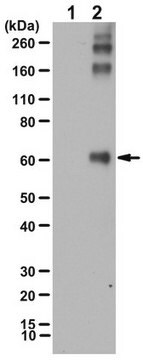MABF164B
Anti-CD19 Antibody, APC Conjugated, (human), clone SJ25C1
clone SJ25C1, from mouse, Allophycocyanin conjugate
Synonim(y):
B-lymphocyte antigen CD19, B-lymphocyte surface antigen B4, Differentiation antigen CD19, T-cell surface antigen Leu-12, CD antigen CD19
About This Item
Polecane produkty
pochodzenie biologiczne
mouse
Poziom jakości
białko sprzężone
Allophycocyanin conjugate
forma przeciwciała
purified antibody
rodzaj przeciwciała
primary antibodies
klon
SJ25C1, monoclonal
reaktywność gatunkowa
human
metody
flow cytometry: suitable
izotyp
IgG1κ
numer dostępu UniProt
docelowa modyfikacja potranslacyjna
unmodified
informacje o genach
human ... CD19(930)
Powiązane kategorie
Opis ogólny
The SJ25C1 antibody is widely used as a phenotypic marker for CD19 expression on B cells, as well as on dendritic cell subsets.
Immunogen
Zastosowanie
Inflammation & Immunology
Jakość
Evaluated by Flow Cytometry in human peripheral blood lymphocytes.
Flow Cytometry Analysis (FC): 0.5 μg of this antibody detected CD19 in one million human peripheral blood lymphocytes.
Postać fizyczna
Przechowywanie i stabilność
Handling Recommendations: Upon receipt and prior to removing the cap, centrifuge the vial and gently mix the solution. Aliquot into microcentrifuge tubes and store at -20°C. Avoid repeated freeze/thaw cycles, which may damage IgG and affect product performance.
Note: Variability in freezer temperatures below -20°C may cause glycerol containing solutions to become frozen during storage.
Inne uwagi
Oświadczenie o zrzeczeniu się odpowiedzialności
Nie możesz znaleźć właściwego produktu?
Wypróbuj nasz Narzędzie selektora produktów.
Kod klasy składowania
12 - Non Combustible Liquids
Klasa zagrożenia wodnego (WGK)
nwg
Temperatura zapłonu (°F)
Not applicable
Temperatura zapłonu (°C)
Not applicable
Certyfikaty analizy (CoA)
Poszukaj Certyfikaty analizy (CoA), wpisując numer partii/serii produktów. Numery serii i partii można znaleźć na etykiecie produktu po słowach „seria” lub „partia”.
Masz już ten produkt?
Dokumenty związane z niedawno zakupionymi produktami zostały zamieszczone w Bibliotece dokumentów.
Nasz zespół naukowców ma doświadczenie we wszystkich obszarach badań, w tym w naukach przyrodniczych, materiałoznawstwie, syntezie chemicznej, chromatografii, analityce i wielu innych dziedzinach.
Skontaktuj się z zespołem ds. pomocy technicznej


![4-[4-(4,4,5,5-Tetramethyl-1,3,2-dioxaborolan-2-yl)phenyl]morpholine AldrichCPR](/deepweb/assets/sigmaaldrich/product/structures/406/675/e288c42e-797b-4bfa-802f-44d36eba033c/640/e288c42e-797b-4bfa-802f-44d36eba033c.png)
![[Ir(dFOMeppy)2(dtbbpy)]PF6 ≥95%](/deepweb/assets/sigmaaldrich/product/structures/322/695/c976a02b-e0ec-4b5e-9a54-5324bd63c032/640/c976a02b-e0ec-4b5e-9a54-5324bd63c032.png)

![[1,1′-Bis(diphenylphosphino)ferrocene]dichloropalladium(II), complex with dichloromethane](/deepweb/assets/sigmaaldrich/product/structures/825/986/4317978b-1256-4c82-ab74-6a6a3ef948b1/640/4317978b-1256-4c82-ab74-6a6a3ef948b1.png)


